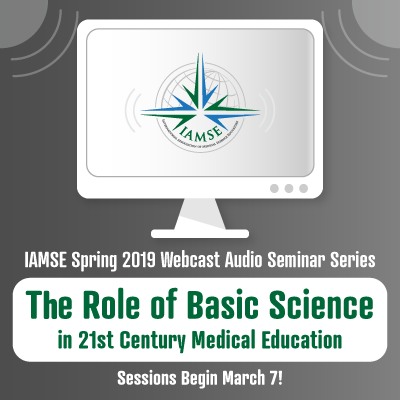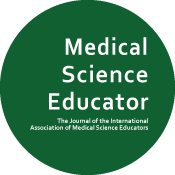[The following notes were generated by Will Brooks, PhD]
IAMSE Webinar Series, Winter 2019
Speakers: John Co, MD, MPH, CPPS, FAAP
Title: The Learning Environment During Residency
Series: The Learning Environment in Health Sciences Education
The IAMSE 2019 Winter Webinar Series, The Learning Environment in Health Sciences Education, continued on January 24, 2019, with a presentation by Dr. John Patrick Co, Director of Graduate Medical Education at Partners HealthCare and Co-Chair of the Clinical Learning Environment Review (CLER) Evaluation Committee for the ACGME. His webinar entitled “The Learning Environment During Residency” took listeners on an informative journey through the learning environment as viewed by the ACGME and CLER program.
Dr. Co began the webinar with a background on how the CLER program began and noted that the learning environment is foundational for everything that occurs within programs and institutions. When the learning environment is less than ideal, the learning that should occur does not occur efficiently and may not occur at all. CLER recognizes six focus areas: patient safety, healthcare quality, supervision, transitions in care, well-being, and professionalism. Dr. Co described three components to the CLER program. First, site visits are conducted to provide formative feedback to programs in each of the six focuses. Second, CLER tracks aggregate data from site visits over time to monitor progress in the six focuses at the national level. And third, CLER develops resources to support stakeholders in their progress toward improving the learning environment for graduate medical education (GME).
Dr. Co provided listeners with a description of the ins and outs of institutional CLER site visits. These site visits can be summarized as a look at how GME is integrated into patient care and education within an institution and what are the measures of success and areas of improvement identified by the institution. Dr. Co stressed that CLER site visits are not accreditation visits, but they are linked to ACGME accreditation in that sponsoring institutions must have a CLER visit every 18-24 months. While accreditation decisions are not made from CLER visits, identification of an egregious violation that would threaten patient and/or resident safety could result in an accreditation action.
CLER is currently in its third cycle of institutional visits. In the first cycle, 298 sponsoring institutions were visited between 2012-2015. These visits were restricted to those institutions with three or more core residency programs. The second cycle of site visits, which occurred 2015-2018, also included those ‘small programs’ with fewer than three core residencies. Site visits are conducted by a team of 1-4 site visitors over the course of 2-3 days. Visits include meetings with senior leadership (CEO and DIO attendance is required); group meetings with a broad representation of residents, core faculty, and program directors; and walking rounds.
Dr. Co went on in the webinar to describe the CLER Evaluation Committee, which he co-chairs. This committee, which is comprised of national experts in GME and the six focus areas mentioned above, meets quarterly to review data from CLER site visits. He then discussed the CLER Pathways to Excellence document, which provides guidance to GME leadership on the learning environment using synthesized input from experts in the field, published literature, and data from CLER visits. CLER National Report of Findings documents have also been released and are available for download. These documents summarize findings from each of the first two CLER site visit cycles.
The webinar continued with Dr. Co providing high-level data from the CLER site visits to the IAMSE community. He first noted a set of overarching themes gleaned from the CLER program.
- Theme 1: Clinical learning environments (CLEs) vary in their approach to and capacity for addressing patient safety and health care quality.
- Theme 2: GME is largely developed and implemented independently of the organization’s other areas of strategic planning and focus.
- Theme 3: A limited number of CLEs have implemented educational programs to ensure all faculty and program directors have the knowledge, skills, and attitudes necessary for their respective roles in training GME learners in patient safety and quality improvement.
- Theme 4: CLEs vary in the degree to which they coordinate and implement interprofessional learning in the context of delivering patient care.
- Theme 5: In general, CLEs lack the mechanisms to identify and eliminate organizational factors that contribute to burnout.
- Theme 6: Health care system consolidation and organizational changes create new challenges for CLEs to align GME with initiatives to improve patient care.
Dr. Co presented data comparing results of the first and second cycles of CLER site visits in the areas of patient safety, healthcare quality improvement, care transitions, and professionalism. While many positive trends were noted between the first and second visits, some lacked the magnitude of improvement perhaps expected, and some data indicated negative trends in specific areas such as care transitions. From these data, a group of challenges and opportunities have been identified for future focus.
Dr. Co concluded the webinar with a summary of recent changes and future directions for the CLER program. Included amongst these are the transition from a focus on fatigue management to more comprehensive examination at well-being, development of subprotocols in addition to the main site visit protocol, the pursuing excellence initiative, and a new focus area on ‘teaming’.







